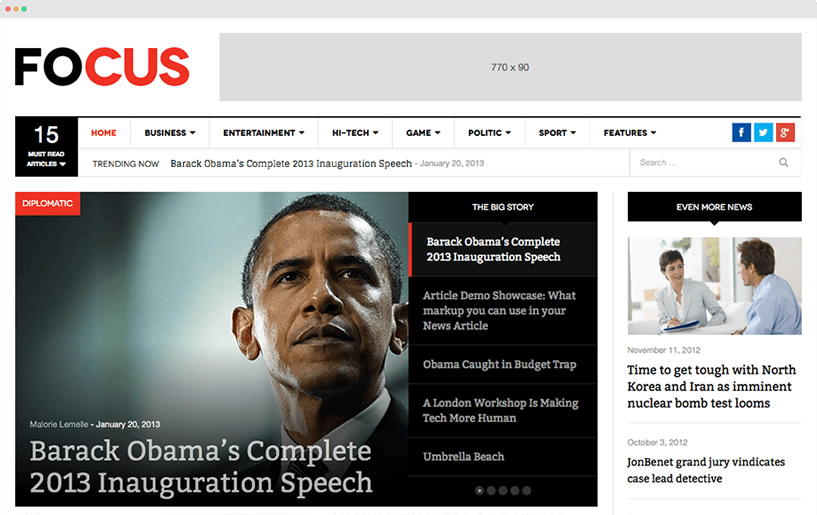The 5-Minute Rule for News Websites
The 5-Minute Rule for News Websites
Blog Article
The Basic Principles Of News Websites
Table of ContentsSome Known Questions About News Websites.The Basic Principles Of News Websites How News Websites can Save You Time, Stress, and Money.The Ultimate Guide To News WebsitesSome Ideas on News Websites You Need To Know
It was down in the UK and Brazil however up some various other nations, such as Greece, Bulgaria, and Poland (News Websites). This year, for the initial time, we asked about the different ways that people avoid the news and discovered that around half of avoiders (53%) were trying to do so in a broad-brush or regular method for instance, by switching off the radio when the information began, or by scrolling past the news in social media sitese.g. scrolling previous information, transforming networks when information begins. of avoiders check sources much less usually. e.g. restriction to specific times of day, shutting off notices, etc. of avoiders stay clear of some subjects. e.g. topics that reduce state of mind or boost anxiousness. You claimed that you attempt to proactively avoid news.

I'm most likely choosing to learn more light-hearted stories than I used to currently. M, 51, UK Turning my back on news is the only way I feel I can deal sometimes. I need to knowingly make the initiative to transform away for my very own psychological wellness.
The 5-Minute Rule for News Websites
Discerning avoidance of Ukraine information was greatest in a number of the countries closest to the dispute, enhancing findings from our extra study in 2015, not long after the war had actually begun. Our information may not recommend a lack of rate of interest in Ukraine from close-by nations but instead a need to handle time or protect psychological wellness from the very actual horrors of war.
Comparing Finland with a politically polarised country such as the United States (see following chart) that is much less influenced by the battle, we find a very various pattern of subject avoidance. In the USA, we find that customers are most likely to prevent topics such as nationwide politics and social justice, where debates over concerns such as sex, sexuality, and race have become highly politicised.
American national politics are rather toxic these days. I discover often that I need to separate from stories that just make me angry. F, 61, United States For some people, bitter and divisive political arguments why not try here are a reason to shut off news altogether, however, for some political partisans, avoidance is typically regarding shutting out point of views you don't wish to hear.

The 15-Second Trick For News Websites
Some are wanting to make information a lot more available for hard-to-reach teams, expanding the news schedule, commissioning even more inspiring or favorable news, or welcoming useful or solutions journalism that provide people a feeling of hope or personal firm. In our survey this year, we asked participants get redirected here about their passion in these different techniques.
This discusses why tales like Ukraine or national politics carry out well with information regulars but can at the very same time turn much less interested users away (News Websites). Careful avoiders are much less thinking about all sorts of news than non-avoiders yet in relative terms they do seem to be much more interested in positive or solutions-based news

The News Websites Ideas
2023). This might hold true in the moment, but over time it appears to be leaving lots of people empty and much less pleased, which may be undermining our link with and depend on in the news. Throughout markets, total count on news (40%) and count on the sources individuals use themselves (46%) are down by a further 2 percent points this year.
Indeed, via the rear-view mirror, the COVID-19 count on bump is clearly noticeable in the following graph, though the direction of traveling after that has actually been mixed. Sometimes (e.g. Finland), the trust boost has been preserved, while in others the upturn looks more like a spot in a story of continued lasting decline.
Several of the highest reported degrees of media criticism are found in nations with highest degrees of mistrust, such as Greece, the Philippines, the USA, France, and the United Kingdom. The least expensive levels of media criticism frequent those with higher levels of trust fund, such as Finland, Norway, Denmark, and Japan.
Rumored Buzz on News Websites
This year we asked respondents about their preferences for text, audio and video when consuming news online. Usually, we find that the majority still prefer to read the information (57%), as opposed to watch (30%) or pay attention to it (13%), yet more youthful individuals (under-35s) are most likely to listen (17%) than older groups.
Behind the averages we find substantial and shocking nation distinctions. In markets with a solid reading tradition, such as Finland and the United Kingdom, around 8 in 10 still like to check out online news, but in India and Thailand, around 4 in 10 (40%) state they like to view news online, and in the Philippines that proportion is over fifty percent (52%).
Report this page